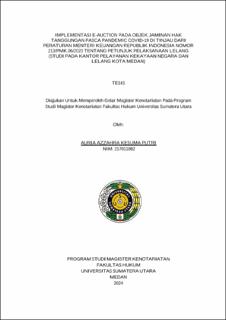| dc.contributor.advisor | Kamello, Tan | |
| dc.contributor.advisor | Sutiarnoto | |
| dc.contributor.advisor | Suprayitno | |
| dc.contributor.author | Putri, Auria Azzahra Kesuma | |
| dc.date.accessioned | 2024-09-23T08:40:13Z | |
| dc.date.available | 2024-09-23T08:40:13Z | |
| dc.date.issued | 2024 | |
| dc.identifier.uri | https://repositori.usu.ac.id/handle/123456789/97557 | |
| dc.description.abstract | The credit facility process is inherently associated with the risk of non- performing loans. Subsequently, debtors who are unable to repay their loans will have their mortgaged properties auctioned through the State Assets and Auction Service Office (KPKNL). During the COVID-19 pandemic, the purchasing power of the public for auctions declined due to disruptions in both the economic and banking sectors. The research problems addressed in this study include: how close bidding offers in e-auction can lead to defaults, how the implementation of e-auction on mortgaged objects post-COVID-19 pandemic is conducted at the State Assets and Auction Service Office of Medan City, and what are the efforts and obstacles in the implementation of e-auction on mortgaged objects post- COVID-19 pandemic at the State Assets and Auction Service Office of Medan City.
This research employs a normative juridical method with a descriptive analytical approach. The types of data used are secondary data consisting of primary, secondary, and tertiary legal materials. Data collection techniques include literature study and interviews. The collected data are then qualitatively analyzed to obtain descriptive analytical results.
The findings of this study indicate that the core substance of the Minister of Finance Regulation of the Republic of Indonesia Number 213/PMK.06/2020 on Auction Implementation Guidelines is comprehensive and complete. However, the regulation appears rigid and does not accommodate the purchasing power conditions of the public during the COVID-19 pandemic. Nevertheless, the legal implications of this regulation on the implementation of e-auction at the State Assets and Auction Service Office of Medan City post-COVID-19 pandemic are negligible because the Indonesian economy has started to improve, resulting in increased public purchasing power, allowing the rules in the regulation to be effectively implemented. | en_US |
| dc.language.iso | id | en_US |
| dc.publisher | Universitas Sumatera Utara | en_US |
| dc.subject | E-auction | en_US |
| dc.subject | Mortgage | en_US |
| dc.subject | COVID-19 | en_US |
| dc.subject | SDGs | en_US |
| dc.title | Implementasi E-Auction pada Objek Jaminan Hak Tanggungan Pasca Pandemic Covid-19 di Tinjau dari Peraturan Menteri Keuangan Republik Indonesia Nomor 213/PMK.06/2020 tentang Petunjuk Pelaksanaan Lelang (Studi pada Kantor Pelayanan Kekayaan Negara dan Lelang Kota Medan) | en_US |
| dc.title.alternative | Implementation of E-Auction on Mortgage Objects Post- Covid-19 Pandemic from The Perspective of The Minister of Finance Regulation of The Republic of Indonesia Number 213/PMK.06/2020 on Auction Implementation Guidelines | en_US |
| dc.type | Thesis | en_US |
| dc.identifier.nim | NIM217011082 | |
| dc.identifier.nidn | NIDN0021046206 | |
| dc.identifier.nidn | NIDN0010105626 | |
| dc.identifier.nidn | NIDN0101056502 | |
| dc.identifier.kodeprodi | KODEPRODI74102#Kenotariatan | |
| dc.description.pages | 120 Pages | en_US |
| dc.description.type | Tesis Magister | en_US |


